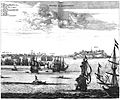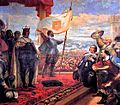Iberian Union facts for kids
The Iberian Union was a state that governed the Iberian Penisula between 1580 and 1640. After the War of the Portuguese Succession, the monarchies of Portugal and the Spanish brach of the House of Habsburg were linked. A dynastic union joined the crowns of Castile, Portugal and Aragon along with their respective colonial possessions, under the rule of the Hispanic monarchy. The Habsburg king was the only element of connection between the kingdoms and territories. The institutions, government and legal traditions of each kingdom remained independent of each other. The alien laws (Leyes de extranjeria) determined that the national of one kingdom was a foreigner in all the other Iberian kingdoms. The term Iberian union was not used at the time, it is a creation of modern historians.
The monarchs had long wanted to unify the penisula: They had the visigothic monarchy in mind. Sancho III of Navarre and Alfonso VII of León and Castile both took the title Imperator totius Hispaniae, meaning "Emperor of All Hispania" centuries before. If Miguel da Paz (1498–1500), Prince of Portugal and Asturias had become king, the union could have been achieved earlier. Unfortunately, he died early in his childhood.
The history of Portugal from the dynastic crisis in 1578 to the first Braganza Dynasty monarchs was a period of transition. The Portuguese Empire's spice trade was peaking at the start of this period. It continued to be very important after Vasco da Gama had finally reached the East by sailing around Africa in 1497–98. Vasco da Gama's achievement completed the exploratory efforts started by Henry the Navigator,. It opened an oceanic route for the profitable spice trade into Europe that bypassed the Middle East.
Throughout the 17th century, the increasing predations and surrounding of Portuguese trading posts in the East by the Dutch, English and French, and their rapidly growing intrusion into the Atlantic slave trade, undermined Portugal's near monopoly on the lucrative oceanic spice and slave trades. This sent the Portuguese spice trade into a long decline. To a lesser extent the diversion of wealth from Portugal by the Habsburg monarchy to help support the Catholic side of the Thirty Years' War, also created strains within the union, although Portugal did benefit from Spanish military power in helping to retain Brazil and in disrupting Dutch trade. These events, and those that occurred at the end of Aviz dynasty and the period of Iberian Union, led Portugal to a state of dependency on its colonies, first India and then Brazil.
Images for kids
-
Acclamation of John IV as King of Portugal, painting by Veloso Salgado in the Military Museum, Lisbon.
See also
 In Spanish: Portugal bajo la Casa de Austria para niños
In Spanish: Portugal bajo la Casa de Austria para niños





